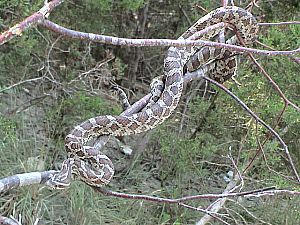Great Plains rat snake facts for kids
Quick facts for kids Pantherophis emoryi |
|
|---|---|
 |
|
| Conservation status | |
| Scientific classification |
|
| Kingdom: | Animalia |
| Phylum: | Chordata |
| Class: | Reptilia |
| Order: | Squamata |
| Suborder: | Serpentes |
| Family: | Colubridae |
| Genus: | Pantherophis |
| Species: |
P. emoryi
|
| Binomial name | |
| Pantherophis emoryi (Baird & Girard, 1853)
|
|
| Script error: The function "autoWithCaption" does not exist. | |
| Synonyms | |
|
|
Script error: No such module "Check for conflicting parameters".
The Pantherophis emoryi, also known as the Great Plains rat snake, is a type of snake that does not have venom. This means it is not dangerous if it bites you. These snakes live in the central parts of the United States, from Missouri to Nebraska, Colorado, and south to Texas. You can also find them in northern Mexico.
Contents
Why is it called Emory's Rat Snake?
The snake's scientific name, emoryi, honors a man named William H. Emory. He was a surveyor who helped map the U.S. border in 1852. He also collected animal samples for the Smithsonian Institution. Because of him, this snake is sometimes called Emory's rat snake.
Other Names for the Great Plains Rat Snake
People call the Great Plains rat snake by many other names. Some of these include the brown rat snake, chicken snake, eastern spotted snake, and gray rat snake. Other names are mouse snake, prairie rat snake, spotted mouse snake, and Texas rat snake.
What Does the Great Plains Rat Snake Look Like?
The Great Plains rat snake is usually light gray or tan in color. It has dark gray, brown, or green-gray spots on its back. There are also stripes on each side of its head. These stripes meet to form a point between its eyes. These snakes can grow to be about 3 to 5 feet (0.9 to 1.5 meters) long.
Great Plains Rat Snake Behavior and Habitat
Great Plains rat snakes like to live in open grasslands or lightly forested areas. They can also be found on coastal plains and in dry, rocky, or mountainous regions. You might often see them on farms. This is why some people mistakenly call them "chicken snakes."
What Do Great Plains Rat Snakes Eat?
These snakes often live in places with many rodents, like mice and rats. Rodents are their main food. They also eat birds, and sometimes other snakes, lizards, and frogs. They catch their food by constriction, which means they squeeze their prey until it cannot breathe.
When Are Great Plains Rat Snakes Active?
Great Plains rat snakes are mostly nocturnal. This means they are active at night. They are also oviparous, which means they lay eggs. In late spring, a female snake can lay as many as 25 eggs.
Tail Shaking Behavior
Like many rat snakes, the Great Plains rat snake will shake its tail very fast when it feels bothered. By itself, this tail shaking makes no sound. But if the snake shakes its tail among dry leaves, it can sound a lot like a rattlesnake. This often causes people to think it is a rattlesnake, even though it is not.
Is the Great Plains Rat Snake Dangerous?
If a Great Plains rat snake feels bothered, it might curl up tightly and shake its tail quickly. Even though this snake has very small teeth and is not venomous, it might bite. However, these snakes are usually very calm and not aggressive.
How Scientists Classify the Great Plains Rat Snake
The scientific name for this snake, Pantherophis emoryi, has changed many times since it was first described. Spencer Fullerton Baird and Charles Frédéric Girard first described it in 1853. For a long time, it was placed in a different group called Elaphe. But recent studies have moved it to the group Pantherophis.
Scientists have also debated if Pantherophis emoryi should be its own species or a subspecies of another snake. Most recently, some scientists suggested that Pantherophis guttatus (the corn snake) should be split into three different species: Pantherophis guttatus, Pantherophis emoryi, and Pantherophis slowinskii.
- Species Pantherophis emoryi at The Reptile Database
 | Bessie Coleman |
 | Spann Watson |
 | Jill E. Brown |
 | Sherman W. White |


